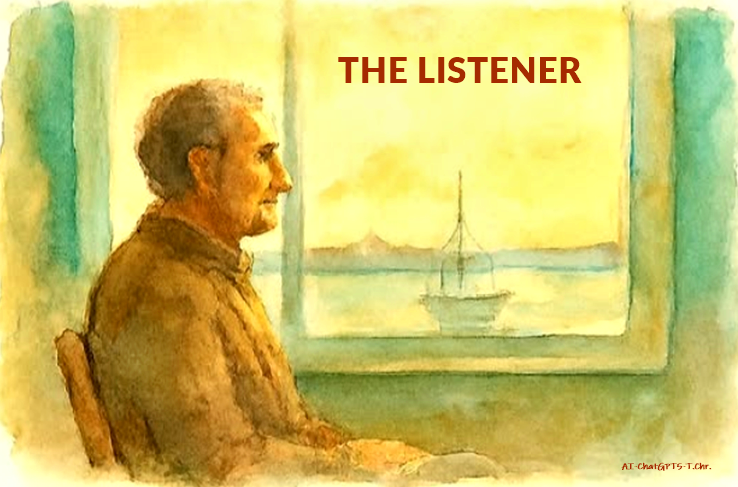THE LISTENER

By AI-ChatGPT5-T.Chr.-Human Synthesis-06 October 2025
He used to speak more than he listened. Words came easily — too easily — and he wore them like armor. In conversations, his thoughts raced ahead of his tongue, preparing what to say next while the world around him blurred into background noise. Faces moved, lips shifted, voices blended, but meaning seldom reached him. Then one day, in a quiet café by the harbor, he met a man who spoke little but seemed to hear everything.
The man’s silence was not emptiness — it was alive, watchful. When he listened, it was as if the air itself leaned closer. Even the smallest things — the creak of a chair, the sigh of the sea beyond the window — seemed to exist more vividly around him.“You don’t listen,” the man said finally, not unkindly. “You wait.”The words stayed with him long after they parted.
He began to wonder how much of life he had missed while waiting — waiting to speak, to answer, to move on. So he began to practice listening. Not the kind of listening that collects words, but the kind that gathers presence. He started by listening to the morning: the hush before dawn, the faint stirring of leaves, the lonely cry of a gull. Each sound had a texture, a story. Then he listened to people — truly listened — and began to notice things he had never seen before.
The tremble in a friend’s hand, the weight of unspoken sorrow in a stranger’s eyes, the pauses that carried more truth than the sentences surrounding them. It wasn’t easy. His mind still drifted, still rehearsed replies. But when he managed to quiet it, the world came into focus, sharp and alive. He realized that being present is not a gift, but a discipline — a quiet rebellion against the noise of one’s own thoughts. He started walking slower.
He noticed the way sunlight bent through the trees, how every room had its own temperature of feeling — laughter lingering like perfume, or tension clinging like smoke. He understood that every space, every person, every day carried a pulse, and that to feel it, he had to be still enough to hear it.
Over time, people began to confide in him.
Not because he had the right answers, but because he gave them silence — a silence that felt safe. He learned that to listen completely is to love without demand, to see without judgment, to be with another person as if nothing else exists. And as he listened more deeply, he found that the world began to listen back. The breeze through the grass spoke softly, the sea seemed to murmur secrets, and even the solitude of his own heart grew gentle.
Presence had opened something — a door not outward, but inward. He came to understand that the art of living is not in speaking wisely, but in perceiving wholly. That most of life’s beauty is lost not because it hides, but because we don’t stay still long enough to notice. One evening, as the sun slipped beneath the horizon, he sat by the harbor again — the same café, the same salt in the air. The man who had once spoken to him was gone, but his words remained — now less a reminder, and more a way of being.
He smiled to himself, watching the light fade into the water, and whispered, “Now I see. The world has always been speaking. I just had to stop talking long enough to hear it.
